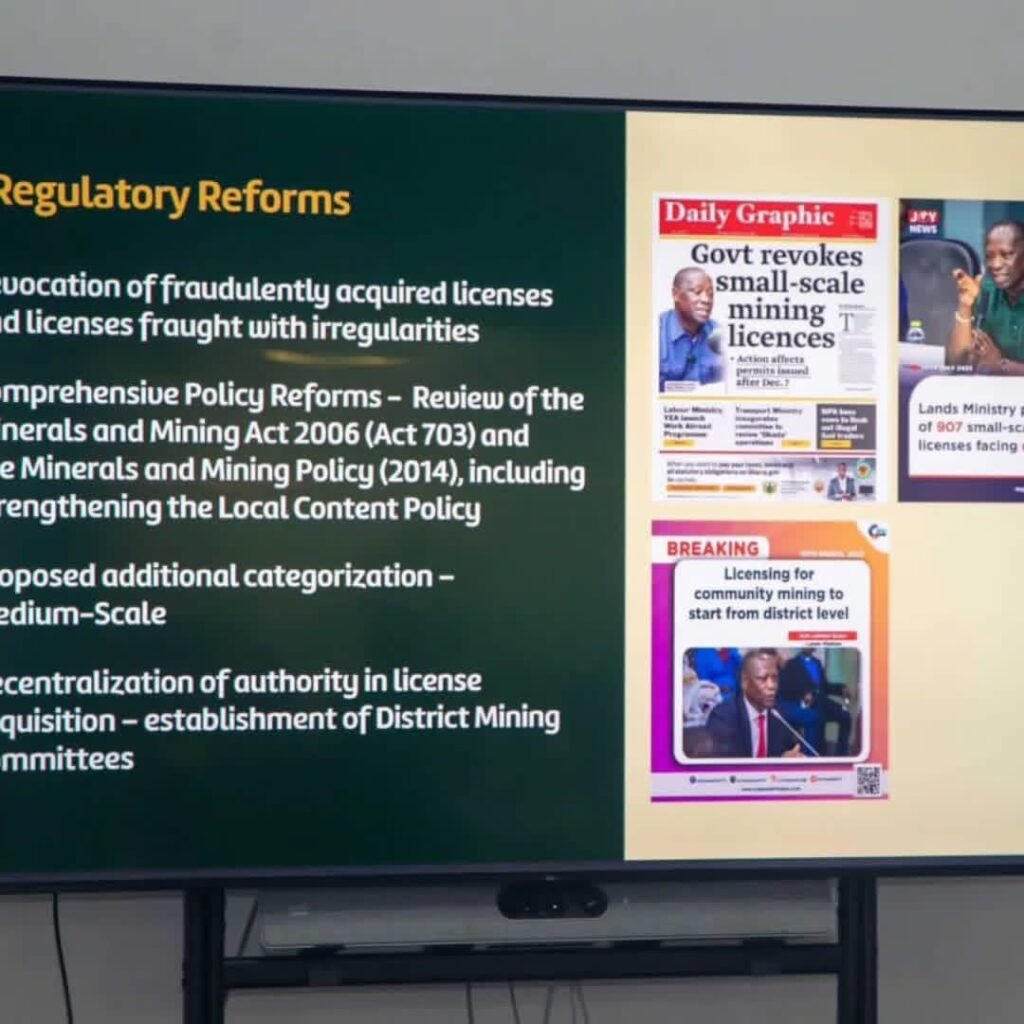The British High Commission on Monday, 13th October, 2025, hosted a “galamsey speaker series” meeting which featured array of stakeholders ranging from government officials, civil society organizations such as Coalition Against Illegal Mining, etc. as well as officials from the health sector.
During the meeting, the Director of communications at the Ministry of Lands and Natural Resources, Ms. Ama Mawusi Mawuennyefia delivered her keynote speech on behalf of the sector minister, Hon. Arma Kofi-Buah, tilted “The Impact, Causes, and the Five-Pronged Strategy in Addressing Illegal Mining in Ghana.”
She highlighted the severe socio-economic and environmental consequences of illegal mining.
“Illegal mining is not just an environmental concern; it is a national development challenge that undermines our water security, public health, and social stability.”
Ms. Ama Mawusi Mawuennyefia
The meeting which was aimed at finding a lasting solution to the long-staggering menace of illegal mining through sustainable mining.
In achieving this, the high-level edition of the meeting served as a platform for stakeholders to share and explore means and measures to have the menace of illegal mining drastically curtailed if not completely eliminated.
Illegal mining as popularly referred to as galamsey has been an existential threat to the nation which has plunged several aspects of Ghanaian lives and livelihoods into various magnitudes of danger including environmental degradation, exposure to heavy metals, pollution of water bodies etc.

In responding to this existential threat, governments have over the years employed various approaches in tackling the menace. All these efforts while, have one way or the other yielded mild or little results according to some, the menace still persists in gross danger in a monumental proportion.
As the impact gets intensify, several measures have also been adopted in response; over the months, government have rollout series of initiatives to help combat this existential threat such as deployment of military to the hotspot zones, seizing of excavators, training of the blue water guards, etc. while this is viewed by many as national threat, the fight is not just left to the government.
Many other institutions including the media, civil society, and even international bodies, have joined the fight either directly or indirectly. It is through this, that the British High Commission has organized this series to bring on board, experts and policymakers to deliberate to see to it that while experts share ideas, policymakers are there to tap into their ideas.
Impacts and Solutions.

A panel discussion followed the keynote, featuring experts from the health sector, the Ghana Coalition Against Illegal Mining, the Ministry of Lands and Natural Resources, and the Office of the Presidency.
The discussion highlighted the wide-ranging consequences of illegal mining, including mercury contamination, deforestation, public health risks, and loss of biodiversity.
The Participants as well emphasized the urgent need for stronger collaboration among stakeholders i.e ministries, local communities, and traditional authorities.
Calls were also made for intensified public education campaigns and education to sensitize citizens on the dangers of illegal mining, the importance of sustainable practices as well as the need for responsible mining.
UK-Ghana Focused on Environmental Sustainability

The Galamsey Speaker Series forms part of the British High Commission’s broader partnership with Ghana, focused on advancing responsible resource governance and environmental sustainability.
Speaking at the close of the event, a representative of the British High Commission reaffirmed the UK’s commitment to supporting Ghana’s efforts to combat illegal mining and promote a greener, more resilient future.
As Ghana continues to suffer from the complex impacts of galamsey, initiatives like this forum which provides platforms for stakeholders to share and deliberate on what should be done and what should be avoided are critical in driving informed policy, multi-sectoral collaboration, and long-term solutions.




















